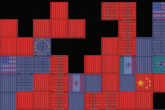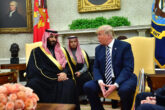November 12, 2014
America Needs Economic Statecraft in Asia
Few U.S. national security officials pay much attention to the Asia-Pacific Economic Cooperation (APEC) forum or economic statecraft in general. But they should. The APEC meeting just completed in Beijing is fraught with strategic implications. In a region where economics is synonymous with security, the impact of the quarter-century-old institution to promote trade liberalization may change the course of tomorrow’s security framework.
A quarter century from now, we will know whether China genuinely wished to be a responsible stakeholder by adopting and adapting existing international institutions. While China experts argue over the degree to which Beijing is buying into the existing global system or bent on a revisionist path, U.S. officials need to realize that they are facing a “use-it-or-lose-it” crisis that has nothing to do with nuclear weapons.
Read the full article on War on the Rocks.
More from CNAS
-
Game Over?
The trade wargame suggests that sustained high tariffs could create leverage and urgency to spur action toward a productive restructuring of the international trade system....
By Emily Kilcrease & Geoffrey Gertz
-
Middle East Security / Energy, Economics & Security
Trump Inks $600 Bn Deal In Saudi Arabia | Musk, Blackrock CEO Flank Trump In Gulf VisitIn today's episode of India Global, U.S. President Donald Trump secured a $600 billion commitment from Saudi Arabia on Tuesday to invest in the United States. NDTV's Gaurie Dw...
By Daniel Silverberg
-
Energy, Economics & Security / Technology & National Security
Tariffs and Tech: An Uncertain RecipeHigher tariffs could prompt American cloud companies to shift more of their capital investments abroad....
By Pablo Chavez
-
Trump Tariffs: How Will U.S. Plans Reshape the Global Economy?
Donald Trump says he's already decided the tariffs he will impose on countries that export goods to America, including the United Kingdom. Channel 4 hears from Emily Kilcrease...
By Emily Kilcrease




